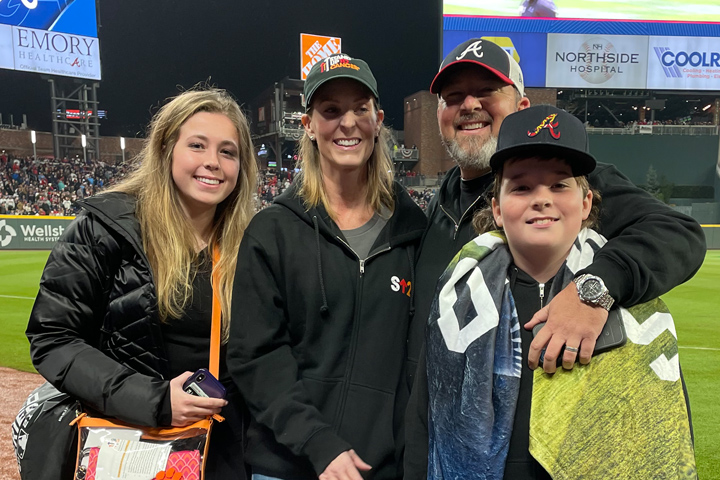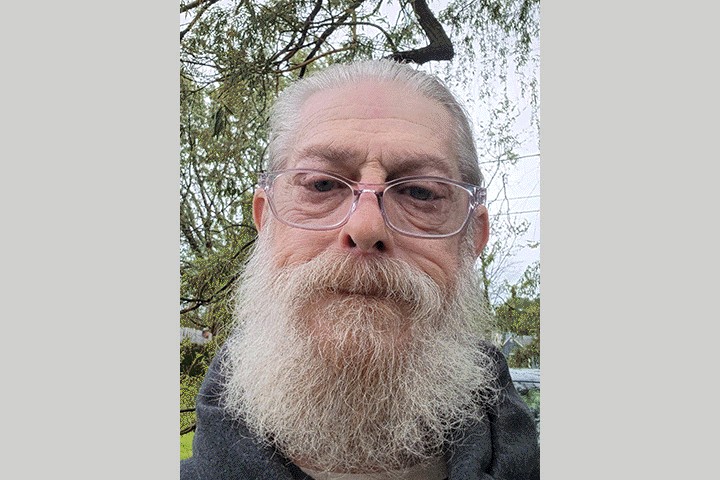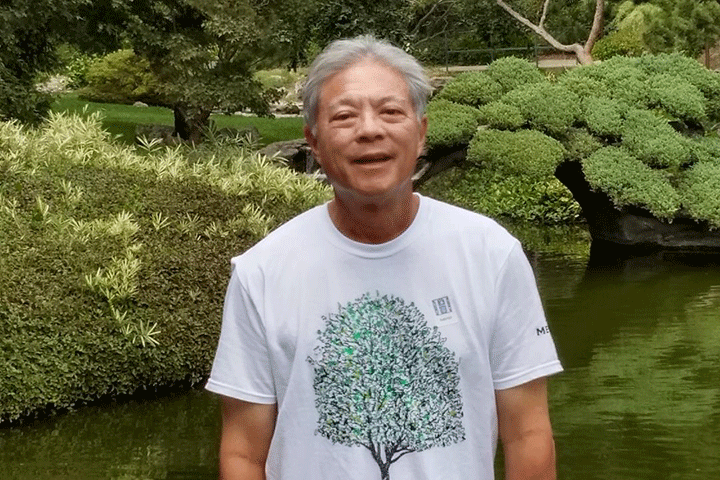Cherishing the Simple Things

- Pancreatic cancer diagnosis after giving birth
- Chemotherapy, radiation, surgery, and more chemotherapy
- Recurrences and more surgeries
- Genetic mutation found
- Treatment with a PARP inhibitor
- Treatment with an immunotherapy combination
Two weeks after the birth of my second child, I was diagnosed with stage IV pancreatic cancer. I was 31 years old.
Halfway through my pregnancy, I began feeling unwell. I couldn’t eat much without feeling full. I was experiencing nausea and vomiting, and I began losing weight. I was also really tired. My OB/GYN performed an ultrasound and found large cysts on my ovaries and decided to schedule me for regular ultrasounds to track their size.
As my pregnancy progressed, my symptoms continued. At 34 weeks pregnant, I was admitted to the hospital to receive supplemental nutrition. Two days later, on October 20, 2010, I went into labor, and gave birth to my son via C-section. He was six weeks premature and was sent straight to the NICU. At the same time, I was admitted to the ICU, due to a build-up of fluid in my abdomen and in my lungs. I wound up having a hysterectomy.
Finally, after two weeks in the hospital, I was sent home and my son came home two days after that. The night he came home, I noticed my left arm was swollen and felt warm to the touch. An ultrasound later that day revealed a blood clot in my arm, which often signals an active cancer. I was readmitted to the hospital in order to dissolve the clot. While there I underwent both an endoscopy and a colonoscopy. Both tests came back negative. I was sent for an abdominal CT scan, and the next day the doctor came into my room to share the news: I had stage IV pancreatic cancer. Needless to say, it was a terrible shock.
The Beginning of a Long Journey
My first oncologist was Dr. Daniel Dubovsky (now retired) at Atlanta Cancer Care. When I first met him, he said something to me that I will always remember: “No one holds a crystal ball to your life.” He gave me so much hope. Dr. Dubovsky had heard Dr. Daniel Von Hoff of HonorHealth in Scottsdale, Arizona, speak at a conference, and suggested I go see him. Dr. Dubovsky helped me by providing all the information I needed to make an appointment with Dr. Von Hoff. The two doctors coordinated my treatment.
At the time of my diagnosis, I was not a candidate for surgery, so my first course of treatment was chemotherapy. I began in November 2010 with infusions every two weeks of gemcitabine and oxaliplatin. In June 2011, Dr. Dubovsky and Dr. Von Hoff changed the protocol. I was given gemcitabine and Abraxane every two weeks, and Zometa was added once per month. I continued with this protocol until January of 2012.
By the winter of 2012, the scans were looking very promising and we were ready to prepare for surgery. Dr. Von Hoff suggested I go see Dr. Douglas Evans, an expert surgeon who specializes in pancreatic cancer, at Froedtert Hospital in Milwaukee, Wisconsin, to discuss whether or not surgery was a possibility. Dr. Evans agreed to do the surgery and Dr. Von Hoff was very confident that I was in good hands.
First, I received six weeks of radiation to my pancreas and iliac bone, under the care of Dr. Nancy Wiggers at Saint Joseph’s Hospital in Atlanta. In March of 2012, I traveled to Milwaukee, where I underwent a procedure to remove the tail of my pancreas, my spleen, and part of my stomach lining. The procedure, which was performed by Dr. Evans, took eight hours, and removed 75 percent of my pancreas. I spent three and a half weeks recovering in Milwaukee before returning home.
Following my surgery, I began a chemotherapy regimen of 5-FU in order to kill any remaining cancer cells, which I continued until April 2013. I also began having scans every three months, to see if the cancer had come back.
Successes, Setbacks, and a Genetic Mutation
In May of 2014, my doctors found a lesion on my left lung. In July of 2014, I had surgery to remove the cancer, performed by Dr. John Gouldman at Northside Hospital in Atlanta.
Around the same time, I also began experiencing seizures. An MRI of my brain and spine revealed that the cancer has metastasized to the left side of my brain. In November of 2014, I had brain surgery with Dr. Allan Friedman at Duke University Hospital, Durham, North Carolina. As a result of that surgery, I have a drop foot and have had to use a brace on my leg. I also have limited strength in my right arm.
Following the surgery, I had a week-long course of stereotactic radiation to my brain, also at the Duke Cancer Center, with Dr. John Kirkpatrick. I continue to see him every three to four months for an MRI.
After the radiation in 2014, I took the chemotherapy pill Lynparza, a PARP inhibitor that targets my PALB2 genetic mutation (my father carries the same mutation). My condition was stable until 2018, when a routine scan found another lesion in my brain. I had a second one-week course of stereotactic radiation in July 2018, along with Temodar. I continued taking oral Lynparza and added Temodar until 2019. I also took part in a clinical trial of an oral PARP inhibitor called BGB-290.
Routine Monitoring and Immunotherapy
Throughout 2019-2020, my doctors monitored my brain closely. In April of 2020, an MRI found a suspicious area in my brain, and we treated it with a new chemotherapy drug, carboplatin. I received the carboplatin via infusion every three weeks. At this time, we discovered that the pancreatic cancer had spread to my scalp. In October of 2020, I had surgery to remove the cancer on my scalp. Dr. Timothy Rankin at HonorHealth in Scottsdale performed the surgery. He was wonderful about trying to save as much hair as possible! In December 2020, I underwent radiation to my scalp.
My doctors discovered a study from Miami on patients with advanced pancreatic cancer who also have PALB2 genetic mutations that shows remarkable results from the immunotherapy combination of Opdivo and Yervoy. I did four rounds of the combination of those two drugs, and my doctors were amazed at how good things looked on my three-month scan. Currently, I receive an infusion of Opdivo every four weeks. Immunotherapy is such a blessing to me because I experience no side effects with it. I am able to get my infusion and go about my business. I also continue to receive Zometa every three months.
When Dr. Dubovsky retired in 2018, Dr. Ming Chi took over as my clinician, and she is wonderful. Similarly, Dr. Von Hoff no longer sees patients. Dr. Erkut Borazanci is my current pancreatic cancer specialist, and he continues to work closely with Dr. Von Hoff. My nurses at HonorHealth, Lana Caldwell and Gayle Jameson, have been so compassionate on some of the hardest days of my life. They are great listeners who genuinely care about me. All the doctors, nurses, and staff have become like family to me!
Enjoying the Simple Life
When I was diagnosed with stage IV pancreatic cancer, I never imagined I would be here 11 years later. But here I am, living with my husband Patrick and my two children, Abigail (16) and Andrew (11) and enjoying all of the simple pleasures of life, like traveling, going to the movies, and watching my kids play sports. From 2014 to 2020, I taught preschool, which gave me a real sense of normalcy during all he years of treatments and surgeries. Now, I am a stay-at-home mom and I love it. I haven’t felt this good in several years and it’s a blessing for me to cook a meal, do laundry, or take my son to practice. I cherish all of the simple things I am able to do, and my main priority is focusing on my healing and spending time with my family.
Watch Elizabeth tell her story in “The Mother I’ve Always Wanted To Be.”






